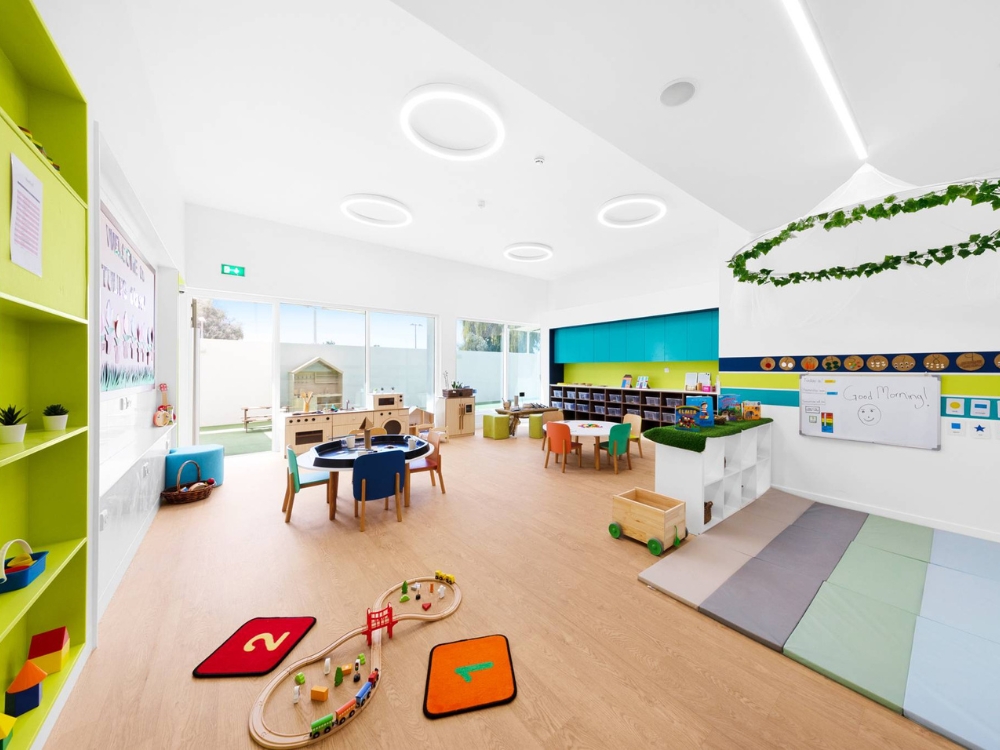Discover the profound impact of music on early childhood development. Explore music and early childhood development at nurseries in Dubai. Music plays a pivotal role in nurturing vital skills like language acquisition, cognitive abilities, and emotional regulation during the formative years. Nurseries in Dubai recognize this significance and integrate music into their curriculum to enhance learning experiences for young children. Through engaging musical activities and exposure to diverse rhythms and melodies, children not only enjoy but also benefit from improved social interaction, creativity, and overall development. Explore how these nurseries harness the power of music to create a stimulating environment that fosters growth and well-rounded education.
Music and Early Childhood Development – Explore The Role
Brain Development and Language Skills
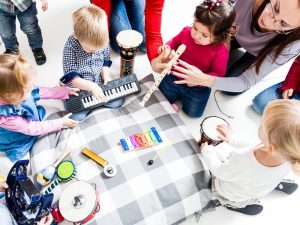 Music is a powerful tool for stimulating brain development in young children. Exposure to music at an early age can significantly enhance language and communication skills. For example, listening to rhythmic patterns in songs can help children develop their language abilities.
Music is a powerful tool for stimulating brain development in young children. Exposure to music at an early age can significantly enhance language and communication skills. For example, listening to rhythmic patterns in songs can help children develop their language abilities.
Playing musical instruments or engaging in musical activities like singing nursery rhymes can foster social interaction among toddlers. These interactions promote emotional expression, allowing children to communicate their feelings through music when words might fail them.
Social Interaction and Emotional Expression
Research indicates that musical activities have a positive impact on the social development of young children. By participating in group music sessions, kids learn how to take turns, share instruments, and collaborate with others. This fosters a sense of community and belonging from an early age.
Moreover, music provides a unique outlet for emotional expression for toddlers who may not have developed verbal skills fully yet. Through melodies, rhythms, and movements associated with music, children can convey their emotions effectively without relying solely on words.
Motor Skills Enhancement
In addition to cognitive benefits, exposure to music has been linked to improvements in motor skills and coordination among young children. When kids engage in activities like dancing or playing simple percussion instruments like drums or shakers, they are refining their motor skills without even realizing it.
Furthermore, research shows that the rhythmic patterns present in many types of music can help young children develop better coordination between different parts of their bodies. This improved coordination translates into better physical abilities as they grow older.
Understanding Early Learning Through Music
Multisensory Learning Experience
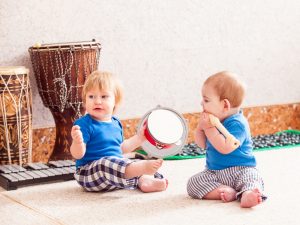 Music in early childhood development offers a multisensory learning experience that engages children in various ways. Through music, kids not only hear sounds but also see movements, feel rhythms, and sometimes even taste or smell related items like snacks during music time at nurseries in Dubai. This holistic sensory experience helps children better understand the world around them.
Music in early childhood development offers a multisensory learning experience that engages children in various ways. Through music, kids not only hear sounds but also see movements, feel rhythms, and sometimes even taste or smell related items like snacks during music time at nurseries in Dubai. This holistic sensory experience helps children better understand the world around them.
Musical activities are crucial for developing listening skills and auditory discrimination among young children. By engaging with different musical tones, pitches, and rhythms, kids learn to distinguish between sounds more effectively. For instance, when playing musical games where they have to identify specific instruments or beats, children enhance their ability to listen attentively.
Singing songs and participating in rhythmic activities play a significant role in supporting the development of early literacy skills among toddlers and preschoolers attending nurseries in Dubai. When children sing along to nursery rhymes or follow rhythmic patterns through clapping or dancing motions during music sessions, they unknowingly improve their vocabulary retention and language comprehension skills.
Benefits of Music in Child Development
Promotes Creativity
Playing musical instruments is not just fun; it also aids in enhancing fine motor skills and hand-eye coordination among young learners. Whether it’s tapping on drums with drumsticks or plucking strings on a small ukulele provided by nurseries for music classes, these actions require precision control of hands and fingers. As kids practice manipulating these instruments accurately over time during music lessons at nurseries in Dubai, they refine their fine motor abilities.
Engaging with various musical elements such as tempo changes or volume adjustments during singing sessions can help young children develop self-regulation skills too. When kids are encouraged to slow down their singing pace for a lullaby or lower their voice volume for a quiet song at nursery school performances, they learn how to control their impulses gradually—a vital skill for emotional regulation later on.
Music provides an avenue for creative expression where youngsters can explore different sounds freely without fear of judgment while attending nurseries offering diverse musical experiences across Dubai’s vibrant cultural landscape.
Boosts Self-Confidence
Engaging with music in nurseries in Dubai can significantly boost young children’s self-confidence and self-esteem. Whether it’s performing a song or mastering a musical instrument, accomplishments in music can instill a sense of pride in children.
By participating in musical activities such as group performances or choir singing, kids learn the value of teamwork while gaining confidence through shared achievements.
Furthermore, receiving positive feedback on their musical efforts reinforces children’s belief in their abilities and encourages them to take on new challenges with confidence.
Enhances Cognitive Development
Research indicates that exposure to music plays a crucial role in enhancing overall cognitive development among young children. Musical experiences stimulate various parts of the brain responsible for memory retention, problem-solving skills, and language development.
Listening to music with patterns or beats helps improve concentration levels among children by training their brains to focus for extended periods.
Moreover, learning how to play an instrument involves coordination between hands and eyes while reading sheet music enhances literacy skills at an early age.
Music and Emotional Intelligence in Young Children
Recognizing and Expressing Emotions
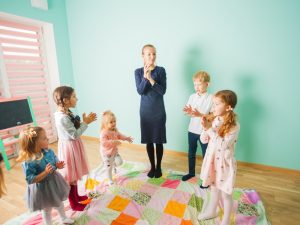 Music plays a crucial role in early childhood development, helping children identify and communicate their feelings effectively. Through music, kids can recognize various emotions like happiness, sadness, excitement, or calmness. For example, upbeat tunes may make them feel energetic and joyful, while soothing melodies could evoke a sense of tranquility.
Music plays a crucial role in early childhood development, helping children identify and communicate their feelings effectively. Through music, kids can recognize various emotions like happiness, sadness, excitement, or calmness. For example, upbeat tunes may make them feel energetic and joyful, while soothing melodies could evoke a sense of tranquility.
Musical activities in nurseries provide an avenue for young ones to express themselves emotionally through EYFS Expressive Arts and Design. By engaging in singing, dancing, or playing instruments with peers, children learn to convey their emotions through rhythm and melody. This helps them build vocabulary around feelings and enhances their ability to articulate what they are experiencing.
Listening to different genres of music exposes children to diverse emotional tones and moods. For instance, lively songs might encourage kids to be playful or active while gentle compositions could promote relaxation or reflection. Experiencing this range of musical styles broadens their emotional repertoire as they learn how sounds can influence how they feel.
Fostering Empathy
Participating in musical activities nurtures empathy by encouraging children to understand the emotions conveyed through melodies and lyrics. When kids engage with songs that depict various feelings such as love, friendship, or perseverance, it cultivates compassion toward others’ experiences. Group music sessions at nurseries in Dubai where children collaborate on creating harmonies or rhythms together fosters teamwork skills as well as empathy.
Moreover, musical experiences offer a safe space for young ones to explore complex emotions without judgment. Whether through improvisation on instruments or composing lyrics about personal experiences during nursery music classes; these activities enable children to express themselves authentically while learning about empathy towards others’ perspectives.
Safe Emotional Outlet
In early childhood settings like nurseries, music serves as a valuable tool for emotional regulation among youngsters who may struggle with managing intense feelings effectively otherwise. Children often find solace in listening to calming melodies when upset or using rhythmic patterns during dance movements as a form of release from pent-up emotions.
Enhancing Cognitive Skills Through Music
Improved Mathematical Abilities
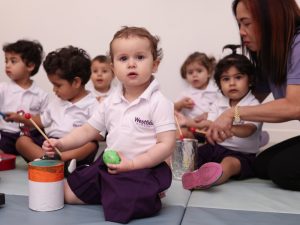 Music and early childhood development go hand in hand, with studies showing a connection between musical training and enhanced mathematical abilities in young children. By engaging with rhythm and melody, kids can improve their pattern recognition and sequencing skills.
Music and early childhood development go hand in hand, with studies showing a connection between musical training and enhanced mathematical abilities in young children. By engaging with rhythm and melody, kids can improve their pattern recognition and sequencing skills.
Music is not only about tunes; it plays a crucial role in cognitive development. For instance, when children learn songs with lyrics, they are enhancing their language acquisition skills while expanding their vocabulary. This dual benefit of music helps nurture both musical appreciation and linguistic capabilities simultaneously.
Stimulating Critical Thinking
Engaging in musical activities for kids at an early age stimulates critical thinking by encouraging problem-solving and decision-making skills. Whether it’s learning to play an instrument or participating in group singing sessions, children are constantly challenged to think creatively and make decisions based on the music they are interacting with.
Musical exposure from a young age has lasting effects on cognitive abilities well into adulthood. The mental agility required to understand complex rhythms or harmonies sharpens the brain’s ability to process information efficiently. It’s like giving the brain a workout that strengthens its capacity for critical thinking.
Fostering Holistic Development
In nurseries across Dubai, integrating music into early childhood education programs is becoming increasingly popular due to its holistic developmental benefits. Beyond just academic success, music helps nurture emotional intelligence alongside cognitive growth.
- Music enhances mathematical abilities.
- Learning songs boosts language acquisition.
- Musical activities stimulate critical thinking.
- Improves pattern recognition and sequencing skills.
- Enhances vocabulary development through lyrics.
Music Activities for Early Learners
Singing Nursery Rhymes
Singing nursery rhymes is beneficial for language development, rhythm, and phonemic awareness. It helps children learn new words, understand sentence structures, and improve their pronunciation. For instance, singing “Twinkle, Twinkle Little Star” can enhance vocabulary and comprehension skills in young learners.
Nursery rhymes like “Old MacDonald Had a Farm” can help kids recognize animal sounds while improving their memory retention. These songs also aid in developing a child’s sense of rhythm through repetitive verses. The rhyming words in these songs support phonemic awareness by highlighting similar sounds.
Engaging with nursery rhymes not only boosts language skills but also encourages social interaction among children as they sing together during group activities or circle time at nurseries.
Dancing to Music
Dancing to music is an excellent way for early learners to enhance their gross motor skills, balance, and coordination. Movements such as jumping, spinning, and clapping along with music help children develop muscle strength and control. For example, dancing to fast-paced music can improve agility and coordination in young learners.
Through dance activities like freeze dance or following simple choreography steps, children can refine their motor planning abilities while having fun. This movement-based play fosters creativity and self-expression in kids while promoting physical exercise.
At nurseries in Dubai or other educational settings worldwide, incorporating dance sessions into the daily routine can contribute significantly to the overall development of preschoolers’ physical capabilities alongside cognitive growth.
Playing Percussion Instruments
Playing simple percussion instruments introduces young learners to basic musical concepts like beat, tempo, and dynamics. Instruments such as tambourines, rhythm sticks, and shakers allow children to explore different rhythms, sounds, and volumes through hands-on experience. By tapping along with a steady beat on a drum or shaking a maraca softly and then loudly, kids grasp the idea of tempo changes and dynamic variations in music. For instance, a group activity where each child plays an instrument according to cues from the teacher enhances listening skills, fosters teamwork, and teaches them about musical structure.
Call-and-Response Activities
Engaging in call-and-response activities during music sessions encourages active listening and participation among early learners. The leader sings a phrase or makes a sound, and the rest of the group responds by echoing it back. This interactive practice promotes attentiveness, memory recall, and vocal expressions in children. Call-and-response games like “Simon Says”with a musical twist encourage kids to follow instructions closely while enjoying the rhythmic elements of response. Children benefit from this activity by improving their auditory processing abilities and social engagement through shared musical experiences.
Selecting the Right Nursery with a Music Program
Prioritizing Music Education
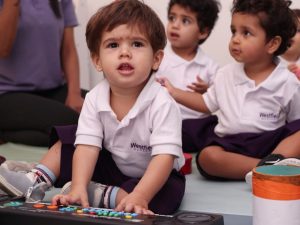 When choosing a nursery for your child, prioritize institutions that integrate music education into their curriculum. Music plays a crucial role in early childhood development by enhancing cognitive skills and fostering creativity. Nurseries that value music often have structured programs designed to introduce children to various musical concepts.
When choosing a nursery for your child, prioritize institutions that integrate music education into their curriculum. Music plays a crucial role in early childhood development by enhancing cognitive skills and fostering creativity. Nurseries that value music often have structured programs designed to introduce children to various musical concepts.
Nurseries in Dubai offering comprehensive music programs can significantly benefit young learners. These programs typically include activities like singing, dancing, and even basic instrument exploration. By immersing children in diverse musical experiences, nurseries create an environment conducive to holistic development.
It is essential to consider the qualifications of the nursery’s music teachers when evaluating potential options. Competent instructors with expertise in early childhood music education can make a significant impact on your child’s learning journey. Teachers who are passionate about music and skilled at engaging young children can create enriching musical experiences within the nursery setting.
Observing the Integration of Music
Visiting prospective nurseries allows parents to observe firsthand how music is integrated into daily activities. Look for signs that indicate a strong emphasis on music education, such as dedicated music rooms or regular music sessions scheduled throughout the week. Observation provides valuable insight into how effectively the nursery incorporates music into its overall educational approach.
During your visit, pay attention to how teachers incorporate musical elements into various learning experiences. For example, songs can be used during transitions between activities or as mnemonic devices to help children remember information better. Dancing may be incorporated into physical education sessions or as part of creative movement exercises.
Exploring how nurseries utilize different forms of musical expression, such as rhythm instruments or interactive song games, offers a glimpse into the breadth of musical experiences available to students in the EYFS Expressive Arts and Design. The variety of musical activities provided can enhance children’s auditory discrimination skills, rhythmic abilities, and overall appreciation for music from an early age.
Inquiring About Musical Experiences
When assessing nurseries with music programs, inquire about the range of musical experiences offered beyond traditional classroom settings.
- Does the nursery near me provide opportunities for group singing or ensemble performances?
- Are there specialized classes focusing on specific aspects of music theory or practice?
- Do they offer exposure to diverse genres of music from around the world? Nurseries in Dubai Emphasizing Music Education
Importance of Music in Early Childhood Development
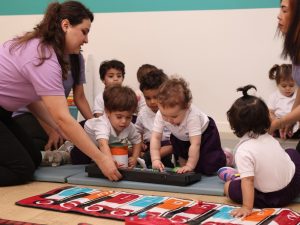 Music plays a crucial role in early childhood development, fostering various skills like language, cognitive, and social development. Children exposed to music tend to have enhanced creativity and improved memory retention. In nurseries across Dubai, educators recognize the significance of incorporating music into the curriculum.
Music plays a crucial role in early childhood development, fostering various skills like language, cognitive, and social development. Children exposed to music tend to have enhanced creativity and improved memory retention. In nurseries across Dubai, educators recognize the significance of incorporating music into the curriculum.
Some nurseries offer specialized programs that focus on utilizing music as a tool for enhancing learning outcomes. Through these programs, children not only enjoy musical activities but also develop essential skills such as coordination, concentration, and emotional expression. The structured approach of these programs ensures that children receive a well-rounded education that includes music as a core component.
In addition to structured programs, nurseries provide an environment where children can freely explore and engage with music. This freedom allows them to discover their preferences in terms of instruments or genres while encouraging creativity and self-expression. By fostering this exploration from an early age, nurseries contribute significantly to shaping well-rounded individuals who appreciate the arts.
Technology Integration for Enriched Musical Experience
Nurseries in Dubai are at the forefront of integrating technology and interactive tools into their music education programs. Utilizing modern tools like educational apps or digital instruments enhances the learning experience by making it more engaging and accessible for young learners. For example, interactive whiteboards can be used to teach musical concepts visually, making learning fun and effective.
The integration of technology also enables personalized learning experiences tailored to each child’s pace and preferences. By leveraging apps or software designed for musical education, nurseries can cater to different learning styles effectively while keeping children motivated through interactive lessons. This approach not only makes learning enjoyable but also ensures that each child receives individualized attention based on their needs.
Integrating Music into Daily Activities at Nurseries
Transition Times
Incorporate music during circle time or mealtime to engage children and make transitions smoother. Utilize songs and rhymes to create a fun atmosphere while moving from one activity to another.
Regular exposure to music can enhance language development in young children. Songs and rhymes aid in vocabulary expansion, helping kids learn new words effortlessly through catchy tunes and repetitive lyrics.
Dedicated Music Corner
Establishing a dedicated music corner within nurseries allows children to explore age-appropriate instruments freely. This space encourages creativity, sensory exploration, and a deeper appreciation for different sounds.
Having a variety of instruments like drums, shakers, xylophones, or tambourines available in the music corner enables children to experiment with creating their melodies and rhythms.
Professional-Led Music Sessions
Organizing regular music sessions led by trained professionals ensures that children receive consistent exposure to music education. These sessions offer structured learning opportunities where kids can develop rhythm, coordination skills, and an understanding of musical concepts.
Professional-led music classes also provide an interactive platform for children to sing along, dance, and play instruments together, fostering social interaction and teamwork among peers.
Parental Involvement in Musical Learning
Singing and Playing Music at Home
Encouraging parents to sing and play music with their children at home can significantly contribute to the child’s musical development. Simple activities like singing nursery rhymes, playing musical instruments together, or listening to a variety of music genres can enhance a child’s auditory skills and rhythm recognition.
Parents who engage in musical activities with their children outside of nursery hours provide them with additional exposure to different sounds and melodies. This exposure helps in developing the child’s sense of pitch, tempo, and overall appreciation for music. By incorporating music into daily routines such as bedtime songs or dance parties, parents create a fun environment that nurtures the child’s musical abilities.
Music resources tailored for early childhood development can guide parents on age-appropriate musical activities suitable for their children. These resources may include recommended songs, instrument options suitable for young kids, and tips on how to make music sessions engaging and educational. By utilizing these resources, parents can effectively incorporate music into their daily interactions with their children.
Workshops and Bonding Sessions
Organizing workshops or parent-child bonding sessions centered around music provides an excellent opportunity for families to connect through shared musical experiences. These sessions can involve group singing activities, introduction to various instruments, or even creating simple homemade percussion instruments together. Such interactive sessions not only foster a love for music but also strengthen the bond between parents and children.
In nurseries where parental involvement is encouraged in musical learning initiatives, organizing workshops becomes crucial. These workshops serve as platforms where parents can learn about the benefits of incorporating music into early childhood education while actively participating alongside their children. These events help create a supportive community within the nursery that values the role of music in holistic child development.
Collaborative Relationship Between Parents and Nursery Staff
Fostering a collaborative relationship between parents and nursery staff is essential to reinforce musical learning at home effectively. Communication channels should be open between both parties so that they can exchange feedback on each child’s progress regarding musical activities conducted both at home and within the nursery setting. This collaboration ensures consistency in reinforcing key concepts related to music education across different environments.
Success Stories: Music and Early Learning in Dubai
Parent Testimonials
Parents in Dubai have shared positive feedback on how music has benefited their children’s development. They mentioned improvements in cognitive skills, emotional well-being, and social interactions. For instance, one parent stated that her child’s language skills significantly improved after starting music classes at a young age. Another parent highlighted how their child’s confidence and creativity blossomed through musical activities.
Music has been a driving force behind the academic success of many children in Dubai. By engaging with music from an early age, children have shown remarkable progress academically. For example, several children who participated in nursery music programs went on to excel academically later on. Their ability to focus, problem-solve, and think critically was notably enhanced due to their exposure to music during early childhood.
Collaborations for Music Education
Collaborations between nurseries, musicians, and organizations promoting early childhood nursery music education are thriving in Dubai. Nurseries often partner with local musicians or music schools to provide high-quality music education programs for young children. These collaborations offer diverse learning opportunities such as interactive musical sessions, instrument exploration workshops, and performances by professional musicians within nursery settings.
Nurseries across Dubai have been recognized for their exceptional music programs, receiving awards and accolades for their commitment to early childhood musical education. These recognitions highlight the importance of integrating music into the curriculum for holistic child development. Award-winning nurseries and early learning centers in Dubai showcase innovative approaches to incorporating music into daily routines while fostering a nurturing environment where children can explore their musical talents freely.
Closing Thoughts
Music plays a vital role in enhancing early childhood development, fostering emotional intelligence, cognitive skills, and overall well-being in young children. Nurseries in Dubai are recognizing the significance of incorporating music into their educational programs to provide a holistic learning experience for children. By selecting the right nursery with a strong emphasis on music education and actively involving parents in musical learning, children can benefit greatly from the enriching effects of music on their growth and development.
Incorporating music into daily activities at nurseries not only enhances children’s learning experiences but also nurtures a love for music from a young age. Parents and educators alike should continue to prioritize music education in early childhood settings to support children’s holistic development fully. Embracing the power of music in nurturing young minds is key to laying a solid foundation for their future growth and success.
Frequently Asked Questions
How does music benefit early childhood development?
Music enhances cognitive skills, promotes emotional intelligence, and aids in language development among young children. It also fosters creativity and improves memory retention, contributing to overall brain development.
What role does parental involvement play in musical learning for young children?
Parental involvement in musical activities at home reinforces the child’s exposure to music and encourages a deeper connection with the art form. Parents can support their child’s musical journey by engaging in singing, dancing, or playing instruments together.
Why is selecting a nursery with a music program important for early learners?
Nurseries with music programs provide an immersive environment where children can explore rhythm, melody, and movement from a young age. Exposure to music at the nursery positively impacts various areas of child development such as social skills, motor coordination, and emotional expression.
How do nurseries integrate music into daily activities for young children?
Nurseries incorporate music into routines by singing songs during transitions, using musical instruments for sensory play sessions, and organizing group dance activities. These practices not only make learning fun but also help children develop auditory perception and fine motor skills.
Can you share success stories related to early learning through music in Dubai nurseries?
Several Dubai nurseries have reported significant improvements in children’s overall development after implementing structured music programs. Success stories include enhanced language acquisition abilities, improved social interactions among peers during musical activities, and heightened creativity displayed by the students.
[ratemypost]
Discover the Joy of Learning
Book a tour today to witness firsthand the engaging learning spaces, well-equipped classrooms, and safe surroundings that make Westfield Nursery the top choice for parents in Dubai.

